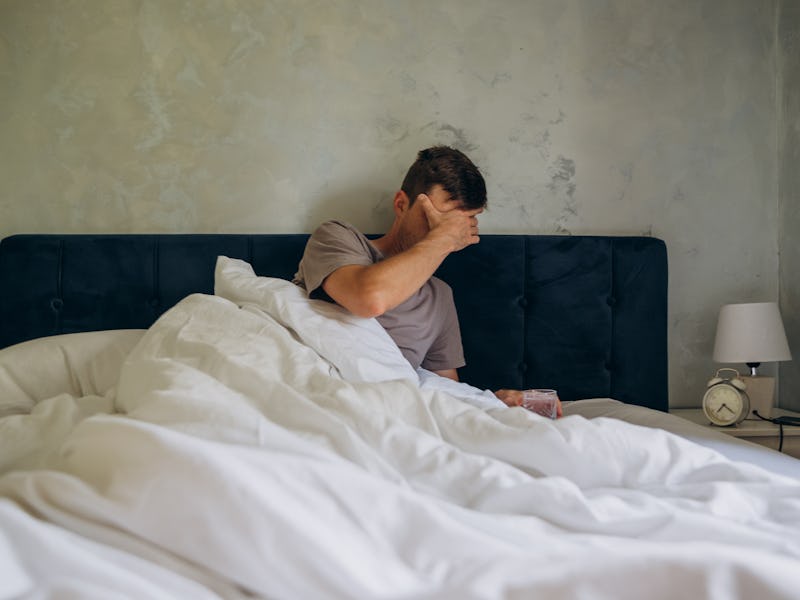Do Dreams Make Your Sleep Quality Worse? A Psychologist Demystifies Our Slumber
Ideally, sleep should not be a stressful activity.

Many factors, from ambient temperature to your most recent meal, can affect sleep quality. But can the dreams — sweat and otherwise — that occur while you slumber also impact shut-eye?
Deirdre Barrett, a psychology lecturer at Harvard University and author of The Committee of Sleep, helps Inverse break down how dreams might change how you feel when you wake up.
Do dreams change how well you sleep?
The answer depends in part on what kind of dream you awaken from. According to Barrett, there’s no formal research on whether pleasant or neutral dreams have any bearing on perceived rested-ness or on sleep’s physiologically restorative effects. But bad dreams certainly affect how well you sleep and how you feel the next morning.
It’s common for someone to experience nightmares on occasion, but not all nightmares are equal. There are two main kinds of nightmares, according to Barrett: What she refers to as regular nightmares and a more intense variety that is part of nightmare disorder.
Regular nightmares occur during the rapid eye movement (REM) stage of sleep. These dreams may be realistic or fantastical but tend not to follow the dreamer into their waking life. Some people experience these “garden variety nightmares,” as she calls them, more often than others.
On the other hand, nightmares that occur more than a few nights every week and interfere with a person’s ability to rest qualify as nightmare disorder.
While a nightmare can be terrifying to experience, the way we feel upon waking is key. This, in part, comes from the production of the neurotransmitter and hormone norepinephrine from the adrenal glands. This chemical increases alertness and affects the sleep-wake cycle. But, Barrett says, that arousal might get channeled into another feeling, like sexual arousal or another type of positive stimulation. Barrett encourages dreamers to assess how they feel immediately upon waking up from a nightmare. Whatever it is — fear, curiosity, excitement — the dreamer, now awake, can seize on it.
Another far rarer type of nightmare is a post-traumatic nightmare. These “are really a thing unto themselves,” Barrett says. In order for bad dreams to qualify as post-traumatic nightmares, the dreamer must have experienced at least one significant trauma in their waking life. Barrett says that these bad dreams are often a literal replay of this trauma and feel much more realistic than other dreams.
These trauma-borne nightmares also disturb the dreamers to the point that they avoid sleeping. “Uniformly, anyone who has them is afraid to go to sleep,” Barrett tells Inverse. She says these dreamers wait for extreme exhaustion before sleeping. Otherwise, they’ll fight the urge to drift off.
Barrett adds that people with post-traumatic stress disorder, in general, seem to sleep worse than those without the disorder, even if they don’t experience post-traumatic nightmares. She says they’re more likely to experience insomnia, awaken at night, and remain in the shallow stages of sleep.
Dreaming of better sleep
Fortunately, there are cognitive practices that people can practice for their garden-variety and trauma-related nightmares. One practice is known as rescripting, which creates alternate endings for post-traumatic nightmares. While awake, the dreamer follows the typical thread of their nightmare but, at the pivotal moment, consciously changes what happens. By practicing this rescripting during waking hours, it’s possible to reroute the dream in sleep. Barrett calls these new fantasies “mastery dreams,” as the dreamer gains mastery over their terrifying experience. In fact, she says this rescripting practice makes mastery dreams more likely to occur.
She also points to a ritual called dream incubation, in which you try to envision and induce certain dreams. The moments before you drift off are critical to incubation. Barrett recommends holding a mental image of a person or place you want to dream of as you’re falling asleep. If you’re not prone to mental visualizations, then she even recommends looking at a physical picture of what you want to dream of until the moment you close your eyes.
Even though, as Barrett says, there’s no evidence that positive or neutral dreams improve a sense of rest, she says that it’s an effective way to reduce anxious thoughts that might keep you awake.
And this is a good reminder always to wish someone pleasant dreams before they sleep.